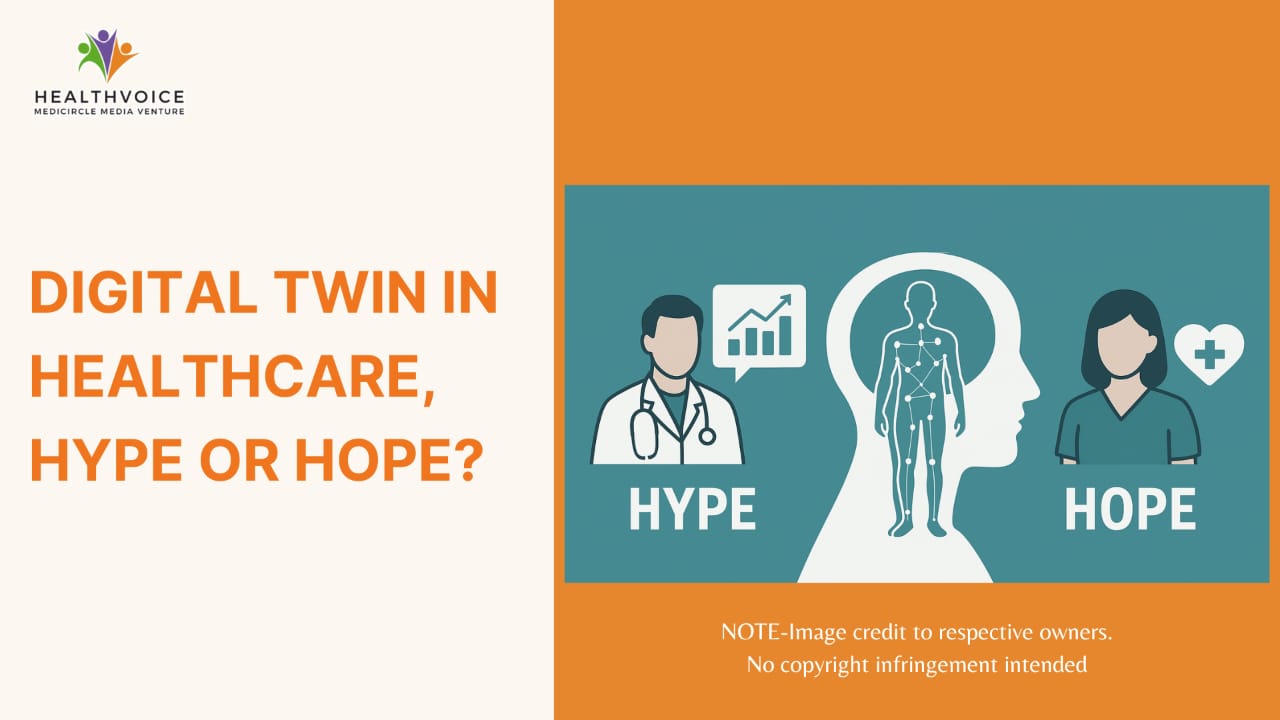Digital Twin in Healthcare, Hype or Hope?
Digital twins are transforming healthcare by creating virtual replicas of organs, patients and hospitals to predict outcomes, improve surgeries and personalize treatments while facing challenges of cost, data and privacy.

These days it is hard to ignore the term “digital twin” if you are interested in where medicine is headed. It sounds like something from a futuristic film; a living, breathing digital copy of a person, an organ or even an entire hospital system. But is this truly groundbreaking technology or just another overhyped concept? The truth is not a simple yes or no. It is a story of incredible potential meeting real world challenges.
What is a digital twin?
Think of it not as a simple computer model, but as a living digital shadow. A digital twin is a virtual replica of a physical thing that is constantly updated with live data. If the real object changes, its digital twin changes too.
A helpful way to picture it is to think of a flight simulator. Pilots train in a virtual cockpit that mimics a real plane in every detail, reacting to their actions just as the actual aircraft would. A digital twin in healthcare works on a similar principle. It could be a virtual version of your heart, built from your MRI scans and ECG reports that beats in sync with your own. Doctors can then run tests on this digital heart without you ever needing surgery. They can see how it might react to a new medication or a specific procedure; all within a safe, virtual space.
It is happening now:
This technology is already stepping out of research papers and into hospitals around the world, showing what is possible.
Practice before the procedure: In delicate brain and heart surgeries, surgeons are now creating digital twins of a patient’s anatomy. This allows them to rehearse the entire operation several times on the virtual organ, find the best possible approach, anticipate complications and reduce the time spent in the actual operating room, leading to smoother recoveries.
Staying one step ahead of illness: For long term conditions like heart disease or asthma, digital twins connected to your smartwatch or other wearable devices can be a game changer. This digital copy mirrors your body’s real time state. If your condition begins to worsen slightly, the twin can flag it days before you feel any symptoms, allowing your doctor to adjust your treatment and potentially keep you out of the hospital.
Smarter hospitals, better care: It is not just about individual patients. Some hospitals are creating digital twins of their emergency wards or ICUs. Administrators can use these models to simulate a sudden inflow of patients, predict bed shortages and ensure enough doctors and nurses are available. During peaks like the flu season, this helps ensure timely care for everyone.
What it means for India?
For a country with a healthcare landscape as complex and diverse as India’s, digital twins offer compelling possibilities.
India is witnessing a sharp rise in lifestyle diseases such as diabetes and hypertension. Digital twins could help shift our focus from simply treating these diseases to actively preventing them. A virtual model could help a doctor design a treatment plan that considers your genetics, diet and even the air quality in your city.
This technology could also bridge the urban-rural healthcare divide. Imagine a farmer in a remote village, a specialist in a metropolitan hospital could monitor the digital twin of his heart, receiving alerts and making informed decisions from hundreds of miles away. This makes expert medical guidance accessible to millions who currently need to travel long distances for care.
On a larger scale, state health authorities could use digital twins to model the spread of diseases like dengue or malaria, plan vaccination campaigns and ensure medical supplies reach where they are needed most.
The road ahead:
This promising future does not come without challenges.
The first major hurdle is data. Building an accurate digital twin requires massive amounts of clean, standardized information from various sources. In India, where health records are often paper based or stored in disconnected systems, gathering this data is a major challenge.
Next comes privacy and security. A digital twin contains your most private health information. Protecting this data from hackers and ensuring it is used ethically requires strong laws and advanced cybersecurity systems, which are still evolving.
Finally, there is the issue of cost and infrastructure. Building and maintaining these systems demands significant investment. For many hospitals, especially in the public sector, this remains a major barrier.
The final word:
So, after weighing everything, is the digital twin all hype? The honest answer is no. The early results from its application are too positive to ignore. It holds genuine promise to make healthcare more personal, predictive and efficient.
However, calling it a magic bullet that will transform Indian healthcare overnight would be premature. The technology is still young and the challenges related to data, cost and privacy are real. It is a hope, one that requires careful planning, collaboration and investment.
The success of digital twins will depend not only on engineers and doctors but also on policymakers, administrators and the trust of patients. For India, this is not just about adopting new technology; it is about seizing an opportunity to build a smarter, more responsive and equitable healthcare system for its billion-plus citizens.
#DigitalTwin #HealthcareInnovation #HealthTech #FutureOfMedicine #SmartHealthcare #DigitalHealth #MedicalTechnology #VirtualHealthcare #AIinHealthcare #PersonalizedHealthcare #HealthcareTransformation #InnovationInHealthcare #HealthcareForAll #SmartHospitals #NextGenHealthcare #HealthcareAI #IndianHealthcare #healthvoice
